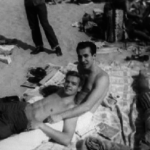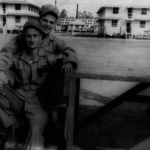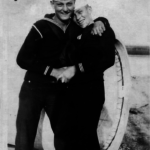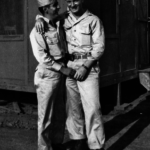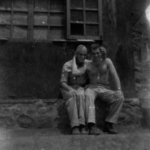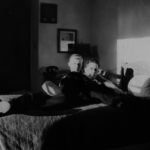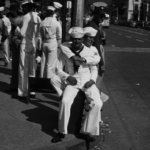WWII Gay G.I.s recounts tale of losing their Lovers
Excerpt from the book Coming out under fire The history of gay Men and Women in World War Two: Combat soldiers often responded to each other’s personal losses with the deepest respect and understanding, allowing gay GIs to express openly their grief over the death of boyfriends or lovers.
Jim Warren’s boyfriend was hit while trying to knock out a machine-gun nest on Saipan. “They brought him back,” Warren recalled, “and he was at the point of death. He was bleeding. He had been hit about three or four times. I stood there and he looked up at me and I looked down at him and he said, ‘Well, Jim, we didn’t make it, did we.’ And tears were just rolling down my cheeks. I don’t know when I’ve ever felt such a lump and such a waste. And he kind of gave me a boyish crooked grin and just said, ‘Well, maybe next time.’ And I said, ‘I’m going to miss you. And I’ll see your mother.’ There were people standing around, maybe seven or eight people standing there, and I was there touching his hand and we were talking. Somebody said later, ‘You were pretty good friends,’ because I had been openly crying and most people don’t do this. I said, ‘Yes, we were quite good friends.’ And nobody ever said anything. I guess as long as I supposedly upheld my end of the bargain, everything was all right.”
Ben Small was even less able to control himself when his boyfriend was killed in the Philippines. But he, too, was surprised by the other men’s compassion towards him. “We had a funny freak attack of a Japanese kamikaze plane,” he recalled, “and I guess he was getting rid of his last load of these baby cutter bomb, these little bombs that explode at about three feet high so if they went off through a tent they exploded at bed level. I had just been in the tent of a guy I had been going with at the time. He crawled into bed, and I said goodnight and walked out the tent. And this plane came overhead and all we heard was explosions and we fell to the ground. When I got up too see if he was all right, the trust of the bomb had gone through his tent and he was not there. I went into a three-day period of hysterics. I was treated with such kindness by the guys that I worked with, who were all totally aware of why I had gone hysterical. It wasn’t because we were bombed. It was because my boyfriend had been killed. And one guy in the tent came up to me and said, ‘Why didn’t you tell me you were gay? You could have talked to me.’ I said, ‘Well, I was afraid to.’ This big straight, macho guy. There was a sort of compassion then.”
After a raid in the Philippines, Ben Small remembered, a lieutenant who had been injured was being shipped back to the States, so the men “all went to the plane to see him off that night. It was an amazingly touching moment, when he and his lover said goodbye, because they embraced and kissed in front of all these straight guys and everyone dealt with it so well. I think it was just this basic thing about separation of someone you cared for, regardless of sex.” Small described this tender parting as “a little distilled moment out of time” when men’s “prejudices were suspended” and gay soldiers “could be a part of what this meant.”

Just another WordPress site


